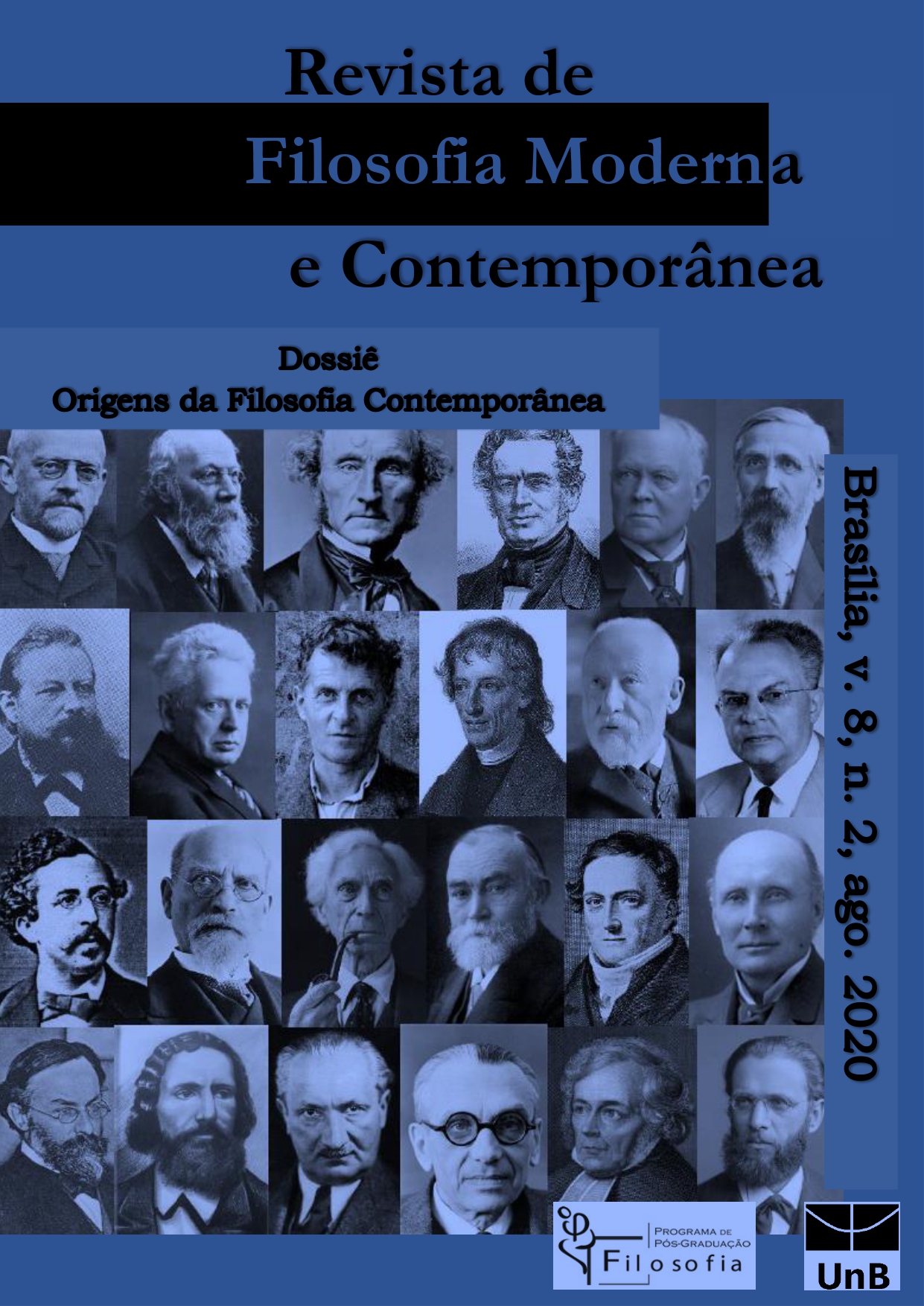Similar Ways of Creating Thirdness
Kant's Synthetic Judgments a priori'' and Frege's Thoughts'' as Intermediate Cases
DOI:
https://doi.org/10.26512/rfmc.v8i2.35848Palabras clave:
Kant. Frege. Logic. Third concept. Intermediate case.Resumen
It is well-known that Kant and Frege offer seemingly exclusive answers to the (epistemo)logical status of equations. Expressions like “7 + 5 = 12” are synthetic for Kant but analytic for Frege. Nevertheless, Kant and Frege have a shared interest: Demonstrating the possibility of grasping a general real by science. Kant’s question is “How is metaphysics as science possible?” Frege answers the question “How is logic as science possible?” Both thinkers are convinced that a precondition for answering their questions consists in the creation of a third concept. But how? Traditionally given mutually exclusive distinctions seem to let no room for such a different third concept. The revolutionary idea is to create basic concepts as molecules(patterns, Gestalten)with a characteristic inner structure opposed to atoms without any inner structure. Such molecules ”“ Kant’s “synthetic judgments a priori” and Frege’s “thoughts” ”“ can be analyzed as2-dimensionally structured intermediate cases.
Descargas
Citas
FREGE, Gottlob. Begriffsschrift, eine der arithmetischen nachgebildete Formelsprache des reinen Denkens. Verlag von Louis Nebert: Halle/Saale, 1879. https://b-ok.cc/book/3517171/f28b88
https://gdz.sub.uni-goettingen.de/id/PPN538957069?tify={%22view%22:%22info%22}
______. Die Grundgesetze der Arithmetik. Eine logische-mathematische Untersuchung über den Begriff der Zahl. Breslau: Verlag von Wilhelm Koebner, 1884.
https://archive.org/details/diegrundlagende00freggoog/page/n7/mode/2up
______. Der Gedanke. Eine logische Untersuchung. Beiträge zur Philosophie des deutschen Idealismus 2, 1918-1919a, p. 58-77. http://www.gavaga i.de/HHP32.htm
______. Die Verneinung. Eine logische Untersuchung. Beiträge zur Philosophie des deutschen Idealismus, vol. 1. A. Hoffman (Erfurt) & H. Engert (Dresden), Verlag der Keyserschen Buchhandlung: Erfurt 1918-1919b, p. 143”“157. http://sammelpunkt.philo.at/533/
______. The Foundations of Arithmetic. A logico-mathematical enquiry into the concept of number. Translated by John Langshaw Austin. New York: Harper & Brothers, second revised edition 1953 (First Harper Torchbook edition published 1960). http://www.naturalthinker.net/trl/texts/Frege,Gottlob/Frege, Gottlob - The Foundations of Arithmetic (1953) 2Ed_ 7.0-2.5 LotB.pdf
______. The Thought: A Logical Inquiry. Translation of FREGE 1918/19a. Mind, New Series, Vol. 65, No. 259, 1956, p. 289-311.
http://inescrespo.altervista.org/nyu/Frege1918.pdf http://www.jstor.org/stable/2251513
______. Begriffsschrift, a formula language, modeled upon that of arithmetic, for pure thought. Complete translation by S. Bauer-Mengelberg. In: HEIJENOORT, Jean van. Frege and Gödel: Two Fundamental Texts in Mathematical Logic. Harvard University Press: Cambridge, Mass. 21970, p. 1-82.
https://www.informationphilosopher.com/solutions/philosophers/frege/Frege_Begriffsschrift.pdf
______. Begriffsschrift, a formula language, modeled upon that of arithmetic, for pure thought. Partial translation (§§1”“12). In: Translations from the Philosophical Writings of Gottlob Frege. Edited and translated by Peter GEACH & Max BLACK.. Oxford: Basil Blackwell 1960a, p. 1”“20.
______. Negation. Translation of FREGE 1918/19b. In: Translations from the Philosophical Writings of Gottlob Frege. GEACH, Peter & Max BLACK (eds. and trans.). Oxford: Basil Blackwell 1960b, p. 117”“135.
GREIMANN, Dirk. Frege on Negative Judgement and Assertion. In: Kriterion, Belo Horizonte, nº 140, Ago./2018, p. 409-428. http://www.scielo.br/pdf/kr/v59n140/0100-512X-kr-59-140-0409.pdf
KANT, Immanuel. Kritik der reinen Vernunft. Nach der ersten und zweiten Originalausgabe herausgegeben von Jens Timmermann. Mit einer Bibliographie von Heiner Klemme. Hamburg: Felix Meiner Verlag 1998. https://www.projekt-gutenberg.org/kant/krvb/krvb.html.
______. Prolegomena zu einer jeden künftigen Metaphysik die als Wissenschaft wird auftreten können. Riga: Johann Friedrich Hartknoch. 1783. Fünfte Auflage mit Einleitung, Beilagen, Personen- und Sachregister herausgegeben von Karl Vorländer. Leipzig: Verlag von Felix Meiner 1920. https://archive.org/download/immanuelkantspr00kantuoft/immanuelkantspr00kantuoft.pdf.
______. Critique of Pure Reason. Translated and edited by Paul GUYER (University of Pennsylvania) & Allen W. WOOD (Yale University). The Cambridge edition of the works of Immanuel Kant. Cambridge: University Press, 1998. https://cpb-us-w2.wpmucdn.com/u.osu.edu/dist/5/25851/files/2017/09/kant-first-critique-cambridge-1m89prv.pdf
______. Prolegomena to Any Future Metaphysics. That Will Be Able to Come Forward as Science. Translated and edited by Gary HATFIELD, University of Pennsylvania, Revised Edition, Cambridge: University Press, 2004. https://b-ok.cc/dl/730730/08f613.
KRIPKE, Saul. Naming and Necessity. In: Semantics of Natural Language. Synthese Library. Wien & New York: Springer 1972, p. 253-355.
MAX, Ingolf. Freges Gedanke und seine nichtklassischen Verwandten. In: Traditionelle und moderne Logik. Zum 65. Geburtstag von Lothar Kreiser. Edited by Ingolf Max, Leipzig: Universitätsverlag 2003, 149-179.
STELZNER, Werner. Wahrheits- und Falschheitsfunktionen in der Begriffsschrift der Grundgesetze. In: Logik und Mathematik: Frege-Kolloquium Jena 1993. Edited by Ingolf MAX & Werner STELZNER. Berlin & New York: Walter de Gruyter, 1995, p. 58-67.
WITTGENSTEIN, Ludwig. Tractatus logico-philosophicus, Tagebücher 1914”“1916, Philosophische Untersuchungen [PU]. Werkausgabe Band 1. Frankfurt am Main: Suhrkamp 1984.
______. Philosophical Investigations [PI]. Edited and translated by Gertrude Elizabeth Margaret ANSCOMBE, 3rd ed. Oxford: Basil Blackwell 1986.
Descargas
Publicado
Número
Sección
Licencia
Derechos de autor 2020 Revista de Filosofia Moderna e Contemporânea

Esta obra está bajo una licencia internacional Creative Commons Atribución-NoComercial-SinDerivadas 4.0.
Los derechos de autor para artículos publicados en esta revista son del autor, con derechos de primera publicación para la revista. Debido a que aparecen en esta revista de acceso público, los artículos son de uso gratuito, con atribuciones propias, en aplicaciones educativas y no comerciales.


